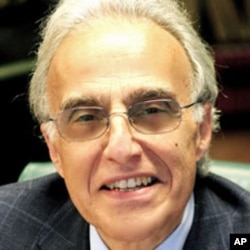With all the turmoil in North Africa and the Middle East, it is a curious time for Western diplomacy. For some insights, VOA’s Susan Yackee turned to John Esposito, Director of the Prince Alwaleed ben Talal Center for Muslim Christian Understanding at Georgetown University in Washington, D.C. We asked him how the relationship between the Islamic world and the West is changing.
Esposito: The potential for the West and the Islamic world both to be moving in a positive direction, that is, for many Muslims in many of the countries where we have seen these popular uprisings, it can mean a life in a society that is far more open, democratic and in which people really have a say over their lives.
|
Listen to the interview with John Esposito:
|
For the West, it will mean, potentially, dealing with more independent allies but, after all, we do that with a lot of other countries. Whether it’s the U.S. dealing with France, which can be very independent, or with China or India. But I think that this is going to be part of what can emerge, namely that rulers are going to be able to operate like rulers in others countries – the way we do, they will operate in terms of national interests, and at times that will mean that they will be independent in terms of the decisions that they will make.
Yackee: Do we need to let the dust settle in the Middle East and North Africa before locking in on an effort of diplomacy?
Esposito: No. I certainly think that we need to let the dust settle before we can make the kinds of predictions that many people would like to make. But in terms of our diplomacy, this is a time to move. We have been supporting autocratic regimes in the region, and that has been a major source - the policies of those regimes and our support for them – for anti-Americanism. We now have an opportunity to, in most of these countries, position ourselves vis-à-vis our own principles, and that is – that we affirm peoples’ rights to self-determination and human rights.
Yackee: Will this be something that President Obama will do?
Esposito: I certainly hope that he will. I think that he has been positioning himself to do that and, as events have unfolded, the Administration can move away from what initially looked like an equivocating position – trying to walk on both sides of the street, and now to begin to move more constructively in support of these situations, and obviously, as governments come into place, to have American aid be primarily in [the areas] of economic and educational development, rather than as it has been in a number of those countries in the past, for military and security.
Yackee: What about military intervention on the part of the West?
Esposito: I don’t think that we should be doing that. I think that there are some arguments to be made symbolically and also maybe in reality that there may be occasions where we could be enforcing no-fly zones, but we certainly should not be thinking about putting troops on the ground.
Yackee: Once the dust does settle in the Middle East and North Africa, should the U.S. have a unique diplomatic plan for each nation or just have a general principle that applies to all?
Esposito: I think our principle has to be both. On the one hand, the general principle should be – and we have said this before – we support the notion of self-determination, popular sovereignty, human rights, etc. That is a generic thing. But then I think you have to deal with each country. Countries in the Middle East and North Africa can be as diverse as the differences between the U.S. and any of a fair number of European countries at the end of the day.




